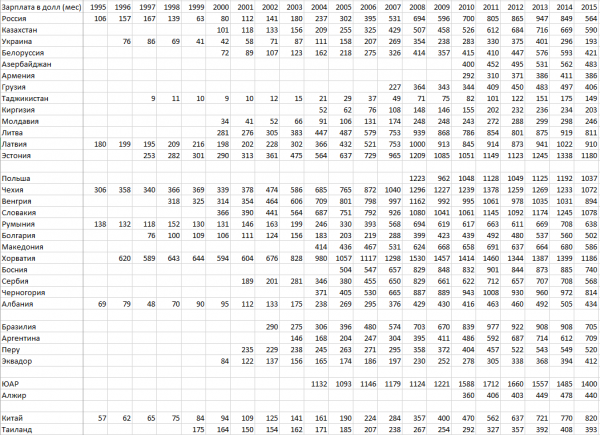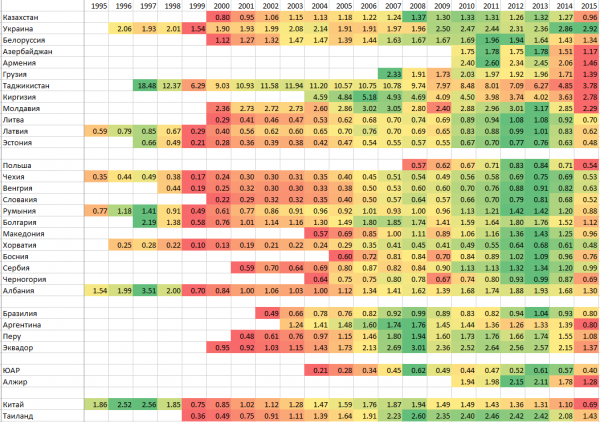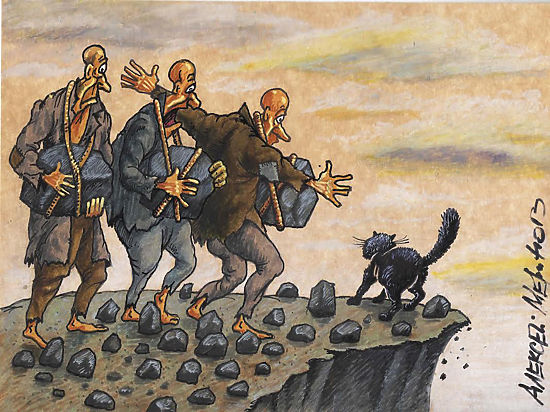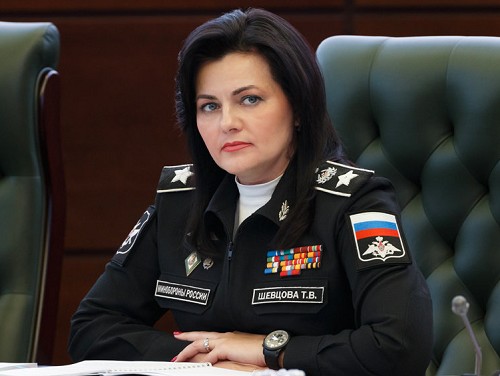
The scale of the unprecedented impoverishment of Ukraine. In January 2016 accrued salary in the Ukraine was only 179 dollars (after taxes even less) and $193 for the entire 2015. In Europe no country, even in Moldavia ($230 and $244 for the year) there is nothing like it. Even by the standards of modern Africa 150 bucks on hand – this humiliation and pastitsio.
In Africa there is no monthly data, but has estimated annual. The average level of monthly salary before taxes for 2015: Algeria – $ 440, Angola – $ 390, Egypt – $ 510, Tunisia – $ 480, Morocco – $ 420, Nigeria – $ 280, SA – focus, about $1400!! If you take the wild African tribes in Chad, Cameroon and Niger, it is possible to find an income below $150 is possible, but … difficult)) the Main problem there is the lack of work as such. Known throughout Zimbabwe revenue balances of about $270-300. Migrant workers on construction sites in Saudi Arabia from Sudan, Yemen, Somalia claim the 400 bucks in his hands. Thus, I will not give the local income in the UAE, Saudi Arabia and Qatar, not to frighten the audience.
The alignment is approximately the same. In Africa, where there are signs of civilization, the income distributed from $150 to $300, in relatively wealthy African countries like Algeria, Egypt, Tunisia and Morocco from $400. South Africa, as an exception. Where there is no civilization – Somalia, Chad, Niger, Congo and the like, then strictly less than 130 bucks. Ukraine with frenzy rushes in the merry company of wild African tribes in all respects, ranging from the economy, to policy and format of government!
By the way, the article on salaries in South Africa. When the article was written, $ 1 = 10-11 South African Rand. Now under 16. Even on the low-skilled positions almost no income below $400.
As for Russia, then in January Rosstat recorded a 32.1 thousand rubles – $413, lower Egypt, significantly below Turkey ($720) and China ($820). 400 bucks is a poor level of Albania, on 15% below Bulgaria, 20% below bombed and destroyed Serbia, Macedonia and Bosnia and say nothing, while they are in another echelon.
To eliminate monthly volatility will lead to correct data annual gross monthly salary in developing countries, among those for which data are available, at least since 2010:

Among the countries of Eastern Europe the average wage is distributed in the range from 450 to 1200, and the highest salary in Poland or the Czech Republic and in Croatia. And the lowest in Albania, Serbia and Bulgaria.
Among the countries of the former USSR the highest wages in the Baltic States and the lowest in Tajikistan, Kyrgyzstan, Ukraine and Moldova. In Uzbekistan and Turkmenistan.
In Brazil and Argentina, in spite of the extreme weakening of the national currency, the salary level is sustainable and is at the same level – 710 bucks a month.
The salaries of Russia to the salaries in other countries.

Surprisingly, from 2000-2011 salaries in Kazakhstan and Belarus grew in the Russian pace. Fall together, too, but in Russia much faster. In 2011-2013, Russia is significantly outperformed in relative terms Belarus and Kazakhstan, but campfireusa all in 2014-2015. In 2001, the Russian wages were 1.27 times higher than Belarusian and 5% lower than in Kazakhstan. It’s been 15 years and nothing has changed. The ratio remained the same. But in Russia there is a noticeable degradation relative to Armenia, Azerbaijan, Georgia, not to mention Tajikistan, where the gap decreased from 10-12 times in 2000-2006 to 3.8 times in 2015.
Also seen one of the worst ratios of Russia and China. In Russia, the revenues were usually always higher, except for the crisis of 1998-2000 and the current period. In the worst period of the crisis of 1998 wages in Russia were 26% lower than the Chinese, now 31% below and almost two times lower than at the beginning of 2016. Almost the same layout for Latin America.
Yet, by the way, a significant event. In Russia wages were not lower than in the countries of North Africa, even in the 1998 crisis. If the average wage will be about 410-450 bucks, we for the first time in history will descend Africa.
While that’s happening. In 2015 the average calculated rate was 61.2 rubles per dollar. If this year will be about 75-77 in the growth of nominal wages by 5%, the salary will drop to 450 $ that will correspond to the level of Iran and the average of North Africa, below Albania, Serbia and Bulgaria not to mention Romania and Hungary. In this sense, the comparison of Russia and Africa – not an insult, but a statement of fact, albeit a tragic one.
Ukraine is clearly becoming the poorest country on the planet, with the exception of countries where there is no civilization. Russia on the path to ranking in the category of “one of the poorest countries of the world among major economies”. The problem for Russia is that Africa, Asia – are growing fast enough. It is quite typical that the growth rate of nominal revenue is greater than 15% at a stable rate of the national currency and about 5-7% real growth per year. In Russia, the nominal incomes grow by 5-7% annually in the course of collapsing and wildest inflation, resulting in a devastating reduction in the purchasing power of incomes. If things continue the way continues, (where the government refuses economic transformation, carrying out an aggressive policy of containment and preservation) after a few years, even countries in Africa will be able to see Russia from the top down, and Ukraine will turn into a European Somalia.
In any case, the fact that Russia compares with the poorest countries of Europe (Serbia, Albania) and Africa is … well, I don’t even know how to speak correctly. This is a very dramatic and embarrassing, Yes. Ah, Stalin knew that very soon Russia will be compared and compete for revenues with Africa and the poorest Asian countries, and not with Western Europe and the USA. And what would he do?








